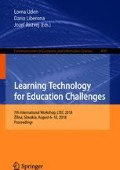Abstract
This work presents an adaptation of an educational Exergame aimed for cognitive stimulation to mobile platforms, specifically Tablets. The educational Exergame “The Incredible Adventures of Apollo and Rosetta in the Space (As Incríveis Aventuras de Apollo e Rosetta no Espaço)” was developed and applied in an intervention with children in the range from 6 to 10 years old in the school context, presented in previous work. This paper proposes a combination of end user-centric techniques for adapting an Exergame aimed for Executive Functions stimulation into mobile platforms. The methodology uses three distinct techniques in the process of the game adaptation: (1) evolutionary model of software development aimed for games; (2) non-participant observation on game applications with voluntary subjects; and (3) semi-structured interview with the subjects. This methodology allows the project’s development team to constantly evaluate the game through prototypes and user tests with voluntary subjects, guaranteeing a continuous process of improvement and polishment of the game. As the results indicate, this end-user centric development enables an effective portability process of the game between different platforms.
Access this chapter
Tax calculation will be finalised at checkout
Purchases are for personal use only
References
Baba, Y., Tschang, F.: Product development in Japanese TV game software: the case of an innovative game. Int. J. Innov. Manag. 05(04), 487–515 (2001)
Carlson, S., Moses, L., Claxton, L.: Individual differences in executive functioning and theory of mind: an investigation of inhibitory control and planning ability. J. Exp. Child Psychol. 87(4), 299–319 (2004). https://doi.org/10.1016/j.jecp.2004.01.002
Christopher, M., et al.: Predicting word reading and comprehension with executive function and speed measures across development: a latent variable analysis. J. Exp. Psychol. Gen. 141(3), 470–488 (2012). https://doi.org/10.1037/a0027375
Diamond, A.: Executive functions. Ann. Rev. Psychol. 64, 135–168 (2013). https://doi.org/10.1146/annurev-psych-113011-143750
Diamond, A., Lee, K.: Interventions shown to aid executive function development in children 4 to 12 years old. Science 333(6045), 959–964 (2011). https://doi.org/10.1126/science.1204529
Hughes, C., Ensor, R.: Executive function and theory of mind: predictive relations from ages 2 to 4. Dev. Psychol. 43(6), 1447–1459 (2007). https://doi.org/10.1037/0012-1649.43.6.1447
Kanode, C., Haddad, H.: Software engineering challenges in game development. In: IEEE Sixth International Conference on Information Technology: New Generations, pp. 260–265 (2009). https://doi.org/10.1109/itng.2009.74
Klingberg, T., et al.: Computerized training of working memory in children with ADHD - a randomized, controlled trial. J. Am. Acad. Child Adolesc. Psychiatry 44(2), 177–186 (2005). https://doi.org/10.1097/00004583-200502000-00010
Koster, R.: Theory of Fun for Game Design, 2nd edn. O’Reilly Media Inc., Newton (2013)
Monette, S., et al.: The role of the executive functions in school achievement at the end of grade 1. J. Exp. Child Psychol. 109(2), 158–173 (2011). https://doi.org/10.1016/j.jecp.2011.01.008
Mossmann, J.B., et al.: Evaluation of the usability and playability of an exergame for executive functions stimulation and its development process. In: Harris, D. (ed.) EPCE 2017. LNCS (LNAI), vol. 10275, pp. 164–179. Springer, Cham (2017). https://doi.org/10.1007/978-3-319-58472-0_14
Robert, H., et al.: Recommendations for the use of serious games in people with Alzheimer’s disease, related disorders and frailty. Front. Aging Neurosci. 6(54) (2014). https://doi.org/10.3389/fnagi.2014.00054
Thorell, L., et al.: Training and transfer effects of executive functions in preschool children. Dev. Sci. 12(1), 106–113 (2009). https://doi.org/10.1111/j.1467-7687.2008.00745.x
Toll, S., et al.: Executive functions as predictors of math learning disabilities. J. Learn. Disabil. 44(6), 521–532 (2011). https://doi.org/10.1177/0022219410387302
Welsh, J., et al.: The development of cognitive skills and gains in academic school readiness for children from low-income families. J. Educ. Psychol. 102(1), 43–53 (2010). https://doi.org/10.1037/a0016738
Acknowledgments
We thank the National Council for Scientific and Technological Development – CNPq/Brazil (http://www.cnpq.br) and National Council for the Improvement of Higher Education – CAPES (http://www.capes.gov.br/) for providing financial support for this study. Finally, we would like to thank Feevale University (http://www.feevale.br) for embracing this research.
Author information
Authors and Affiliations
Corresponding author
Editor information
Editors and Affiliations
Rights and permissions
Copyright information
© 2018 Springer International Publishing AG, part of Springer Nature
About this paper
Cite this paper
Barbosa, D.N.F., Barbosa, J.L.V., Mossmann, J.B., de Cerqueira, B.B., Postai, L.S. (2018). Adaptation of an Educational Exergame to Mobile Platforms: A Development Process. In: Uden, L., Liberona, D., Ristvej, J. (eds) Learning Technology for Education Challenges. LTEC 2018. Communications in Computer and Information Science, vol 870. Springer, Cham. https://doi.org/10.1007/978-3-319-95522-3_24
Download citation
DOI: https://doi.org/10.1007/978-3-319-95522-3_24
Published:
Publisher Name: Springer, Cham
Print ISBN: 978-3-319-95521-6
Online ISBN: 978-3-319-95522-3
eBook Packages: Computer ScienceComputer Science (R0)

